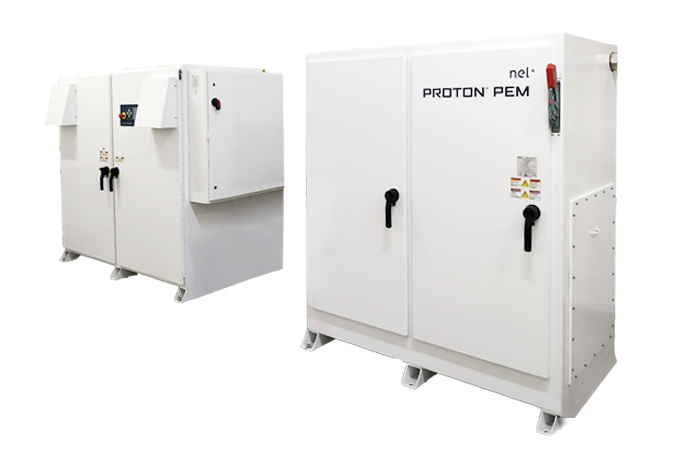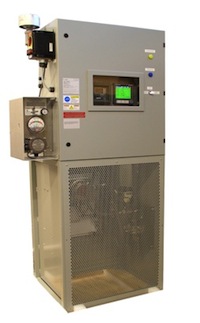
Purpose of Hydrogen cooling in Turbine Alternators Hydrogen is used for cooling Generator’s Rotor windings in Turbine Generator (TG), for the following reasons:
Low H2 Density compared to Air
Hydrogen has one of the lowest gas densities thus offering least resistance to the rotation of the Rotor within the Generator. In turn there is lower energy requirement for rotating the machine countering the offered drag / windage factor.
Excellent Thermal conductivity of Hydrogen
Hydrogen offers the highest heat conductivity property compared to Air or other gases and hence, is a very efficient carrier of generated heat, from a electrical machine. From hereon, the heated Hydrogen is carried to the outside of the machine, where it is cooled and returned continuously, in closed loop circulation.
These are the two reasons why Hydrogen is the preferred gas for Large Electrical rotating machine cooling. Predominantly used for high rotational speed machines, where drag losses play significant absorbed energy impact. Therefore Hydrogen cooling is popular in machines typically 100 MW or larger Steam Turbine, and / or, Gas Turbine, driven Generators.
Importance of Maintaining Hydrogen Pressure, Purity and Dryness
Hydrogen purge pressure
A limited, higher pressure of Hydrogen purge maintained within the Rotor rotating space, increases the gas density. This increased density increases the specific gas conductivity (v/v). Meaning, a lesser volume of Hydrogen gas moved across the rotating machine will effectively remove all the heat. Usually the Hydrogen pressure is maintained in the range 3 to 4 Bar(g).
Hydrogen purity
Hydrogen has molecular weight of 2, while Air is 29. This means Air weighs more than 14 times compared to Hydrogen. The impurity which will afflicts Hydrogen purge is Air due to limited ingress. It is important to note, each percentage point increase of Air impurity in Hydrogen will have a 14 times exponential increase in Gas density within the Rotor space in the Generator. Thus, the increased drag caused is also exponential in value. The best performance will be derived only when the Hydrogen purity within the TG is maintained near constant at 99.5%.
Hydrogen Dew point
Most people understand this aspect well, and many Generator manufacturers even provide/recommend a Hydrogen gas drier within the Hydrogen gas closed-loop circulation. Wet gas is severly detrimental to the life of the windings due to increased risk of corrosion and insulation failure. Hence, it is very important that purge gas Dew point be maintained as low as possible. Usual industry standard is to achieve control at (-) 20C, or lower.
Industry practice for Hydrogen control in Turbine Alternators
Hydrogen pressure
This is easily achieved using good quality down stream gas pressure regulating valves. It is recommended to use a well designed valve, and never think an ordinary air pressure regulator will, do a reliable job.
Hydrogen purity
Most conscientious power generation companies use online Gas analysers and are content maintaining the TG purge purity in a range of 98% to 99.5%. They utilize the Bleed-and-Feed control for maintaining purity by sending out an operator to manually adjust the fresh Hydrogen gas inlet and TG vent valve, to replace some gas within the Rotor space thus improve purity to the max. This process is done once in 23 hours. Good, but not good enough! As one can easily calculate, this constant fluctuation of purity results in average purity of Hydrogen of around 98 to 98.5%.
Hydrogen Dew point
TGs which have within loop Hydrogen Dryer are the lucky ones. They at least have the technical facility to keep Hydrogen Dew point in check. Many Power Utilities are using commercially available Hydrogen gas supplied in Gas cylinders or Bullets. Commercial Hydrogen is typically procured from the off-gas stream of process industries such as Chlor-Alkali plants. This Commercial grade Hydrogen of 99.8% purity (or worse), and questionable Dew point is wet (saturated). Ensuing wet gas affects the Generator winding life. One needs superior quality gas to keep the Dew point low. Just like, you need clean water, to wash dirty clothes. Either this be done by online Hydrogen dryer or use Hydrogen gas of superior Dew point (-) 60C or better, and successfully use the displacement method to control purge atmosphere Dew point.
Financial Impact of Low purity
The loss is so large that we must not ignore it! Data gleaned from Turbine Generator OEM, indicate, windage loss of 250 kW (thereby loss of 250 kW extra saleable power), for every one percent reduction in Hydrogen purity . Every 1% lower Hydrogen purity, will translate to Rs. 4 million (Rs. 40 Lacs) potential loss per year .
Loss due to poor H2 Pressure Management
Low Hydrogen pressure will lead to lower mass heat conductivity. The Hydrogen circulation is usually through a fixed volume Hydrogen circulation blower. Lower heat removal will heat up the Generator and the operator will be forced to operate the TG at lower load. And, again there is loss of revenue!
Higher Hydrogen pressure will lead to higher leakage from Generator’s Shaft seals and body. This will require more Hydrogen replacement volume to maintain the pressure.
Loss due to Dew point
Wet gas within the Generators Rotor space will lead to pre-mature windings insulation failure. Further revenue loss and repercussions, need not be extolled.
How do Proton OnSite products help
StableFlow (Automatic Purity, Pressure and Dew Point control)

StableFlow can be easily retrofitted to the Turbine Generators Hydrogen (sample) line without disturbing the existing Hydrogen piping and instrumentation. Unlike existing analyzers and instrumentation that simply does passive management, StableFlow actively and automatically controls the Hydrogen Pressure, Purity & Dew point simultaneously, by controlling the event rate and new Hydrogen feed flow. It maintains all three parameters, within very close limits of the set points for Pressure, Purity and Dew point.
HOGEN On-Site Hydrogen Generators

HOGEN (PEM Water Electrolysis Type H2 Generators) delivers 24 x 7 High quality Hydrogen directly to the Turbine Generator. Hydrogen gas is available on-demand closely following consumption pattern for capacity control across 100%, at 15 or 30 Bar(g), 99.9995% pure, and at (-) 70C Dew point. Having a HOGEN is like having a cylinder that never goes empty. HOGEN conforms to the world leading international codes and standards and is the only Hydrogen Generator of its type that can be installed in a safe area.
Both above products, each, by themselves help earn more money for the Power generation utility, and if used together, are a formidable money making machine!
About Proton Energy Systems
Proton Energy Systems designs and manufactures Proton Exchange Membrane (PEM) electrochemical systems to make hydrogen from water in a zero pollution process producing safe, pure, reliable onsite hydrogen to meet todays global hydrogen requirements. Proton Energy Systems has been developing and manufacturing world-class electrolysis systems since 1996, with thousands of units deployed world-wide, on every continent. With a reputation for building robust, reliable, and safe systems, federal, state, and commercial partners repeatedly seek the creative solutions that Proton Energy Systems has proven it is capable of delivering. For more information, visit www.ProtonEnergy.com.
Also Read
About MVS Engineering Limited
MVS Engineering is a turnkey supplier of Gas generation equipment, Air and liquid drying equipment. MVS was founded in 1977 and has supplied nearly 7000 Skid mounted units worldwide. Read more about the company in the About Us section of our website.

